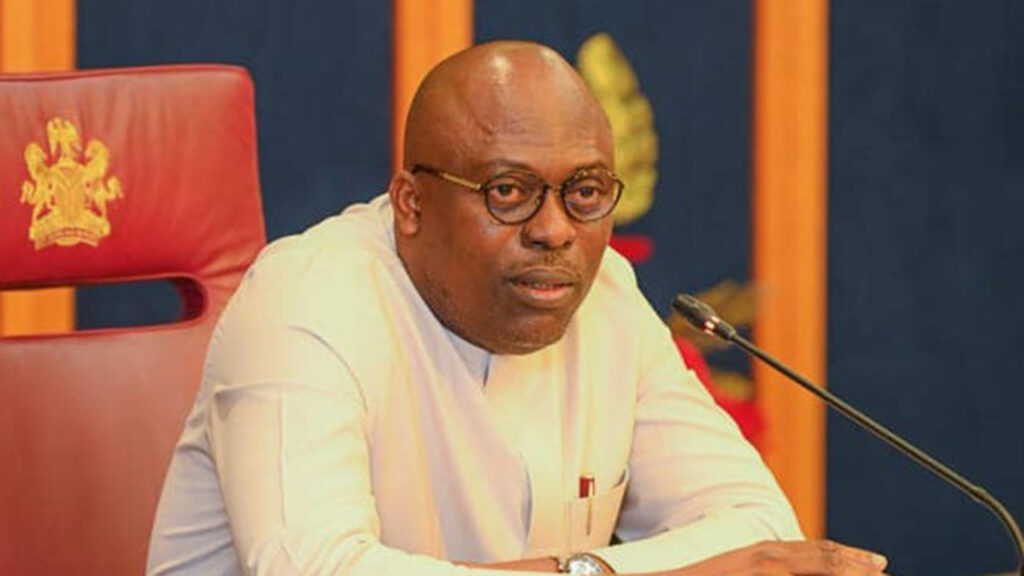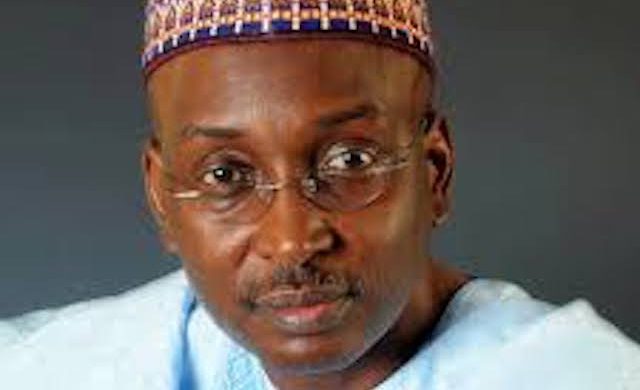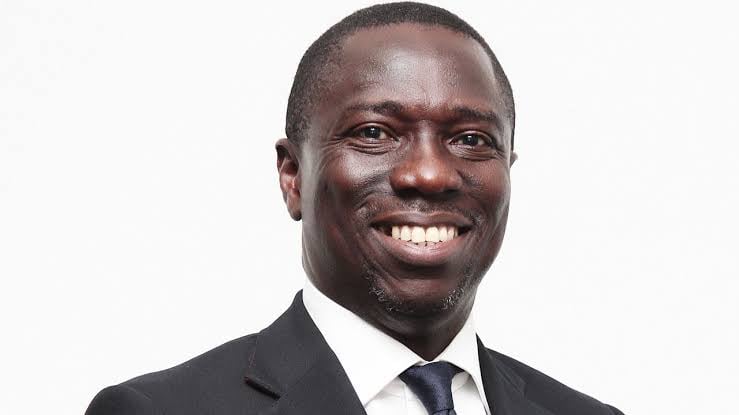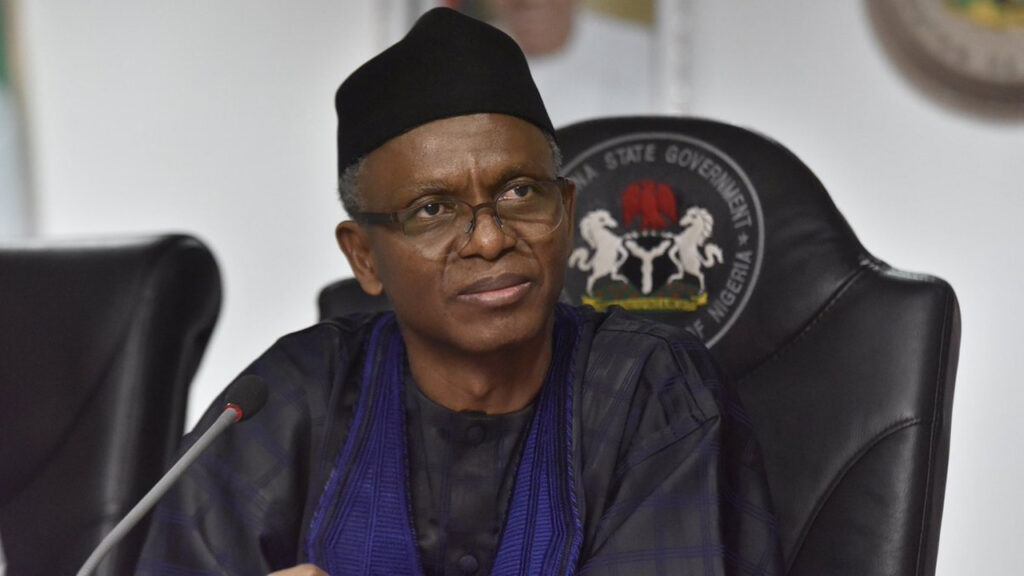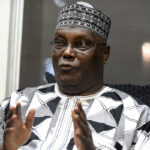
• Aggrieved Senators Plot Headship Of ‘Juicy’ Committees
• Number Of Committees May Rise To 70 To Accommodate More Interests
• Anxiety In Akpabio’s Camp Over Chairmanship Of Appropriation Committee
Despite disagreement over the election of the eight principal officers of the Senate last Tuesday, serious intrigues and game of wits have taken over the four-week-old 10th Senate ahead of the appointment of chairmen of committees.
The Senate leadership, as constituted, is faced with the difficult task of using the appointment of committee chairmen to upset or resolve the agitations and serious political upheaval that have arisen from the election of Presiding Officers as well as the principal officers.
Although Senator Abdulaziz Yari, who mounted serious opposition to the election of Godswill Akpabio and Barau Jibrin as Senate President and deputy Senate President respectively, has since accepted the outcome of that election, there are fears that Yari’s supporters may re-strategise against the leadership in the very near future.
The fear is compounded by the political disagreement that characterised the election of principal officers last Tuesday, which produced Senator Opeyemi Bamidele as Majority Leader. In that exercise, Senate President Godswill Akpabio also announced Senator Mohammed Ali Ndume as Chief Whip of the Senate just as Simon Davou Mwadkwon emerged as the Minority Leader of the Senate against all expectations.
Meanwhile, the move by the Senate leadership to pacify aggrieved Senators with the Chairmanship of ‘Grade A’ committees is causing disaffection in the camp of the Stability Group, which comprises senators that campaigned for the emergence of Akpabio and Jibrin.
During the campaigns, most members of the group had been selected to occupy specific positions. But the election of Bamidele as Majority Leader instead of Ndume changed some calculations, a development which the leadership is citing as precedence to change the arrangements.
The most crucial committee in the Senate is the Appropriation Committee. Senator Solomon Adeola who was the chairman of the Finance Committee in the last Senate, is widely believed among members of the Stability Group to have been selected to chair the Committee. Tension started to build up last Thursday as rumours spread that the position is among those to be used to settle grievances.
Again, it was learnt that committees in the Senate might be raised from 69 to over 70 to accommodate more senators.

Committees in this category include the ones in charge of Appropriation, Petroleum (Upstream and Downstream), Gas Resources, Aviation, Defence, Health, Public Accounts and Works.
Other juicy committees are the ones in charge of Banking, Senate Services, Agriculture, Education, Niger Delta, Finance, Communications and Water Resources.
The rule of the Senate places the responsibility of appointing senators to serve as chairmen and members of committees on the selection committee, which has the Senate President and Deputy Senate President as chairman and vice chairman respectively. Other members of the selection committee are the eight principal officers including Senate Majority Leader.
The Peoples Democratic Party (PDP), which has 36 of the 50 minority senators, hadm a day to the election of principal officers, announced that it intended to continue its consultation with members of its caucus in the Senate, a development which informed its decision to write a letter to Akpabio that it has suspended election of its minority leadership till further notice.
But unknown to the party, some of its members as well as other senators in six other minority parties had met and put their signatures down to support the election of Simon Davou Mwadkwon as minority leader.
The role allegedly played by former Rivers State governor, Nyesom Wike, in this political drama has continued to dominate discussions within National Assembly complex. However, the elected principal officers are frantically working hard to douse the tension that has trailed their emergence.
Defending his emergence, the new Senate Minority Leader, Simon Davou Mwadkwon, said the neglect of the North Central geo-political zones from the current political calculation fueled it.
Mwadkwon stated this during a chat with ARISE TV last Thursday, where he also noted that he respects the former House of Representatives Speaker, Aminu Waziri Tambuwal, who was initially tipped for the position.
He said he regarded Tambuwal as his political godfather, noting that he emerged as the minority leader mainly because he is from the North Central.
He said: “Mr Tambuwal is my political godfather. We’ve related very well. He was my speaker in the 7th Assembly and we speak very often. It would interest you to know that I have a soft spot for Tambuwal that I wish he became the minority leader. But I’m from the North Central. And when we saw the arrangements and the political office sharing in the whole country, the North Central was completely exempted.”

He continued: “So the North Central people met and took a decision and said no, we must also vie for a position in the Senate. We’ve been shortchanged in the House of Representatives. And when it was time for the Senate, we found out that no position had been given to the North Central, and we decided that we must try our best. So, the North Central took a decision. It would interest you to know that all members of the minority parties in the North Central nominated me and decided that I should go and run for this position. And therefore, I accepted the challenge. Therefore, I’ve nothing personal against Tambuwal.
“I think Tambuwal did the magic even on the floor of the Senate that day, because there were a few persons who were not satisfied with my choice and they approached the Senate President saying that we have to go to the executive session. And the president explained to them and they understood the whole thing. And Tambuwal was the one that stood up and said if Senator Simon has this number of signatures, he wishes to state categorically clear that I should be allowed to hold this position.
“So the rumours that I defeated Tambuwal are false. They’re not true. I don’t have an issue with Tambuwal. I respect him; he’s a man of honour and he was my leader when I was in the House of Representatives.”
There has also been discord in the political parties as the principal officers allegedly emerged without their inputs, a situation that had never occurred since 1999 when Nigeria restored democracy.
The All Progressives Congress (APC) National Chairman, Abdullahi Adamu, dissociated himself from the choice of Senator Bamidele as Majority Leader.
As a result, the new Senate Majority Leader, Opeyemi Bamidele, has been trying to explain how the election of principal officers was done.
According to Bamidele, the principal officers were picked, following consultations with “critical stakeholders” and “elected representatives” from the ruling and opposition parties.
Bamidele said: “The emergence of the remaining principal officers was not an issue to be decided by members. Rather it was an issue that needed to be decided among the critical stakeholders of the party, which include members of the National Working Committee (NWC) as well as those already elected into office in the two arms of government and they were able to arrive at the decisions and that was what led to our emergence.
“On the other hand, with regards to the minority leadership, again, it was not entirely a party affair, because it wasn’t a typical situation where you have one opposition party. Rather, six opposition political parties were involved and 50 of our colleagues were also involved.”
Bamidele further explained that rather than the emergence of the officers being a decision of the political parties, it was more of a decision taken by members who were elected on the platform of the six minority parties, stressing that 38 of them, by virtue of their clear signatures, took a decision as to who their leaders will be.
Bamidele added: “Of course, this was also communicated to their respective political parties and as democrats, all the presiding officers could do was to follow suit because more than a simple majority, an overwhelming majority, had decided. With 38 signatures, we have a simple majority out of 50 senators elected on the platform of the opposition political parties. Clearly, 38 of them signed and again it was a very clear-cut situation and it was devoid of rancour.
“We had a plenary session because some of the members of the minority parties felt that it was important to have an executive session before an announcement would be made regarding the minority leaders and the Presiding Officer obliged them and again it was a very mature discussion.
“It was a discussion that centred around the need for all stakeholders to work together. So no victor, no vanquished. At least, we are happy that eventually, the leadership has emerged for the 10th Senate.”
On the rejection of the announcement by the APC chairman, Bamidele said the party boss was well informed.

His words: “With respect to APC, let me put it this way. Everything is in order and let me assure you again that what was read is a consensus list. Please, look through even media reports again and see the names of people who were in Keffi on Sunday to finalise discussions and to report or present themselves to the National Chairman of the party.
“You will see that it was exactly the names of people who were announced today. Check also further reports to see names and pictures of those who also reported themselves in Lagos to Mr President during the Sallah homage. You will see that it is the leadership of the Senate just as espoused today. All stakeholders are on the same page on this and events in the next few hours or days can only go to confirm this.”
Bamidele explained that Senate did not wait for letters from minority parties because it would have brought controversy.
“With respect to minority parties, again, let me emphasise, it is an unusual situation and it shows again the growth of our democracy and the dynamics of our polity.
“Votes of Nigerians are beginning to count more than ever before and we are beginning to see a situation where no political party again can say or boast that “even if we bring a goat, the goat will win” as we used to hear in the past.
“So, if you have six minority parties, acting as vehicles that brought people to the Senate, and you are now looking for a letter, which of the parties will now write a letter? It doesn’t matter how many people are in the PDP. It remains a minority party just like YPP or APGA with only one senator who came in on that platform.
“What was most important and what was more democratic was for all 50 of them to meet as minorities and take their decisions.
“They held some meetings that were deadlocked and it was not for us to look into what they were doing. We had enough to be concerned about as a majority party. It was their own decision and they took their decision. As I said, 38 people signed, their full names, signatures, constituencies that they represent, put them there.
“That carries more weight. If PDP had written, Labour Party would have dissociated itself from it. If Labour Party had written, NNPP would have dissociated itself from it.
“If NNPP had written, APGA might have dissociated itself from it. Look at the leadership that they produced. The minority leader is from PDP which has the majority, which is 36 members,” Bamidele added.




